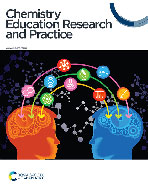Generalized rubric for level of explanation sophistication for nucleophiles in organic chemistry reaction mechanisms†
Abstract
Reaction mechanisms are central to organic chemistry and organic chemistry education. Assessing understanding of reaction mechanisms can be evaluated holistically, wherein the entire mechanism is considered; however, we assert that such an evaluation does not account for how learners variably understand mechanistic components (e.g., nucleophile, electrophile) or steps (e.g., nucleophilic attack, proton transfer). For example, a learner may have proficiency of proton transfer steps without sufficient proficiency of a step where a nucleophile and electrophile interact. Herein, we report the development of a generalized rubric to assess the level of explanation sophistication for nucleophiles in written explanations of organic chemistry reaction mechanisms from postsecondary courses. This rubric operationalizes and applies chemistry education research findings by articulating four hierarchical levels of explanation sophistication: absent, descriptive, foundational, and complex. We provide evidence for the utility of the rubric in an assortment of contexts: (a) stages of an organic chemistry course (i.e., first or second semester), (b) across nucleophile and reaction types, and (c) across prompt variations. We, as well, present a case study detailing how this rubric could be applied in a course to collect assessment data to inform learning and instruction. Our results demonstrate the practical implementation of this rubric to assess understanding of nucleophiles and offer avenues for establishing rubrics for additional mechanistic components, and understanding and evaluating curricula.


 Please wait while we load your content...
Please wait while we load your content...